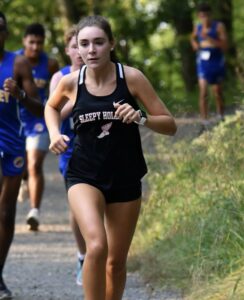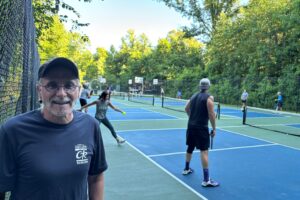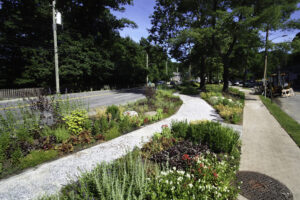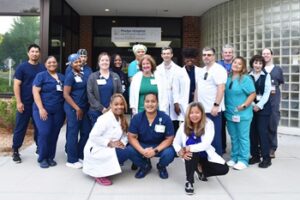
Senior Bianca Vercesi competed in her final race of the cross-country season on Nov. 20. That was the State Federation Meet, where the best varsity runners in New York State gather to compete, racing against one another and their own personal records. She finished in the top 20%.
While her high school cross country season is over, Vercesi continues a highly accomplished career in academics as an active member of various honor societies including the National Honor Society, Math Honor Society, and Rho Kappa.
Vercesi also works with Sleepy Hollow High School to bring athletics to the lives of special education students and help them get out of their ordinary classroom environment. It serves as a valuable experience for both the special ed students and athletes, who continually learn from one another.
Balancing it all, Vercesi admits, is not easy. With the pressure of athletic excellence and the onslaught of deadlines, applications, and out-of-school commitments, it seems that the clock is working against student-athletes who are faced with an apparently unending workload.
“I’m a secretary in both of the honors societies I have leadership roles in, so it’s a lot of organization and a lot of the time I’m focusing on time management, which is really important,” Vercesi said. “But focusing on athletics and maintaining that balance can get kind of tricky sometimes, and it can conflict with practice or a race. That’s a balance that can be a little tough to manage, but I think I’m getting better at it.”
From this, Vercesi has learned the value of self-motivation. Creating athletic goals and sticking to them is an arduous task, but it is one that can be accomplished with the right amount of patience and skill.
Vercesi said, “Because it’s such a mentally exhausting sport, taking from that, you really have to toughen up and say, ‘Alright this is what I’m gonna do.’ You’re racing against your own time, you’re racing against the clock, and you just have to go for it.”
She said it’s important to have faith in yourself, your team, and the process as a whole, and to acknowledge that the road to success will not be easy, but that it will be worth it. One of the people who has reminded her of this is her coach, Paul Gersfeld.
“My coach has really said to me a lot like, you just have to trust the process,” Vercesi said, later continuing, “So those months of training I kind of embraced the fact that this is going to take time, and it’s going to be excruciating at some points, but this is going to pay off—and it did. I’ve learned to be patient with the process that comes with achieving my goals, and it’s not always going to be instantly getting from A to Z or my first goal to getting to States, it’s going to take time. And it did, and I got there.”
But for Vercesi, one of the most impactful parts about being on an athletic team is the sense of community that comes with it, and the supportive atmosphere that Sleepy Hollow High School has fostered.
“We get so much from being a part of our team. And you can feel the excitement, seeing each other in the hallways, whenever kids are wearing their jerseys, or when before races teachers come up to me and wish me luck. That’s something that I won’t forget.”
Q&A with Bianca Vercesi
RJ: Are you involved in any extracurriculars aside from your athletic pursuits?
BV: Outside of sports I’m in basically all of the other Honors Societies. I’m in the National Honors Society, English, Math, Science, Foreign Language, and Rho Kappa. I’m an officer in a few of those, I’m in the Musical Honors Society, which I’m an officer of. Then, outside of that, I work with kids at the special education program at my school and we do sports in the morning, so that’s something that I’m really passionate about.
RJ: What does your work with the special education program mean to you?
BV: So I started working with the special education students in 9th grade, and the program is basically athletes at our school getting to work with students who typically wouldn’t have that exposure to athletics, because being a part of a varsity team isn’t always a level that’s manageable for some of them, and being able to interact with students outside of their smaller classrooms is really important, and getting to bring my own experience with athletics and working with my peers to encourage that is really important. Especially because these kids are always with the same other fifteen or so other kids, so they get to embrace that new class experience.
RJ: How do you tackle the responsibility of having a leadership role as an officer of those honors societies?
BV: I’m a secretary in both of the honors societies, so it’s a lot of organization and a lot of the time I’m focusing on time management which is really important. But focusing on athletics and maintaining that balance can get kind of tricky sometimes, and it can conflict with practice or a race, and that’s a balance that can be a little tough to manage, but I think I’m getting better at it.
RJ: How do you balance community involvement, as well as academic achievement, with the commitment of athletics?
BV: So, I feel like the athletes at our school, the kids who are kind of thriving in their classes and vice versa, it’s really encouraged that academics come first, and that’s always my priority, but once you get to a certain level of athletics, it’s also how can you excel in both environments. So, I think the coaches are really, really encouraging in the sense that they also prioritize academics for us, so whether it’s a practice or getting to a certain event on time, they know that’s a sacrifice that should be made for academics, so that support coming from coaches is really important. I’ve always felt that prioritizing athletics was really encouraged throughout high school.
RJ: What do you find most challenging about being involved in your academics, community, and athletic pursuits?
BV: Specifically with track and running at our school, it’s always been a smaller program participation-wise, so once of the challenges I’ve found myself involved in, is that lack of a big team environment. Other sports like lacrosse and football are really, really engaged, and one of the things I’ve tried to do more of at Sleepy is create that team feeling, that excitement and enthusiasm—I want to bring that to running. It’s not like going to a football game where everyone can come and watch, when you go to a race, it’s individual, you’re isolated from a crowd. So, I want to keep that enthusiasm within the team so that there’s some more excitement and race day is a bigger deal than just getting on the bus going on the run and then leaving. So hopefully the next two seasons we’ll see more of that.
RJ: What motivates you most on the field?
BV: Myself, honestly. I mean, for me running is super, super individual, and once you’re out there, you do have your team around you, and that is motivating in and of itself. But when you have a smaller team, and this year we had a much younger team, it became a lot of self-motivating for me. And that was also something that I struggled with, like, where am I going to get that motivation to push myself? And because it’s such a mentally exhausting sport, taking from that, you really have to toughen up and say, “Alright this is what I’m gonna do.” You’re racing against your own time, you’re racing against the clock, and you just have to go for it.
RJ: What lessons have you learned from being in such an independent sporting environment?
BV: See, I’ve been thinking about this a lot, because with college, it’s a lot of “What have you learned, how have you learned this?” And from sports, I think just being able to take your own achievements and turn them into something else. This season has been really transformative for me. My coach has really said to me a lot like, you just have to trust the process. And at the beginning of the season, I wasn’t running a personal record every race, but I was setting a foundation for the rest of the season, and creating this base for training and strength, so meets were more workouts for me. I knew once I created a certain level of strength as a foundation, I could build upon that. And now it’s November and I started training in August, so those months of training I kind of embraced the fact that this is going to take time, and it’s going to be excruciating at some points, but this is going to pay off—and it did. I’ve learned to be patient with the process that comes with achieving my goals, and it’s not always going to be instantly getting from A to Z or my first goal to getting to States, it’s going to take time. And it did, and I got there.
RJ: How do you think your hard work has paid off?
BV: So, I started training in August while my mileage is up to like 40 miles a week, and in the end of summer and when preseason started, workouts were just to condition. Then throughout September and October meets started becoming more competitive and my times were getting increasingly faster and then we had a league race and then a sectional race and at the sectional race depending on what time you run you can qualify for the state meet. And that wasn’t really on my radar; I mean obviously I was thinking “Wow that would be so cool,” but I didn’t really see it as something that would happen. And so, the first seven runners qualified, and I placed fourth in the sectional meet and so I was the only person to qualify on my team, so that was really an honor. Then once I qualified it was kind of like okay now this is just me, I have to I have to be there obviously and so I went and it was an incredible experience and I got to go with my coach and that was really exciting for me because I wanted him to get to go there. He always said to me, like, “you trusted me, and the season went perfectly” and so that was really really exciting. And then after the state meet selected to run at the State Federation meet depending on what your times were and I got selected, so this is a big deal for me and my coach.
RJ: How did it feel to make it to States?
BV: So, during the season we have a lot of smaller meets with two or three other schools and this competition was unlike any that I’ve ever been up against. It was all the best runners in New York state, and before the race I was trying to tell myself not to be intimidated by it because you are one of those people. It’s hard to gain that confidence when you don’t want to be overly confident, but I told myself that I deserve to be there. And although it was a totally new kind of race and it was unfamiliar, I knew that I was worthy of being there. It was amazing to get to run with those girls because they’re just so incredible, and in that race, you get pushed in every way—mentally, physically and the rest of the athletes totally did that. And this is something I really admire about cross country. Although they’re your competition, you’re all working together and without, you know, the other 284 people around me, wouldn’t have been able to run the time so you really have to work together regardless of the fact that they’re your competition.
RJ: How have you applied the lessons learned from cross country and track to the rest of your life (academics, community service, etc.)?
BV: I think leadership has been a really impactful part of my season and I was talking about motivating my teammates and filling that role as somebody who needs to inspire the rest of the kids. It’s not the most appealing sport because it’s hard to say, “Oh, I like to run.” Not a lot of people say that, so I want my teammates to be able to say that at the end of the season. As a captain, I think that I’ve brought that into other aspects of my life and into classes. I’ve seen it with my younger teammates for the most part who have just totally transformed from the beginning of the season, and I think their mindset about working hard and it is paying off his change because they’ve done that and it has paid off. So hopefully I can bring that into other aspects of my life, as a leader, inspiring other people.
RJ: What do you consider to be your best accomplishment?
BV: I think this season has really changed my view on myself as an athlete. At the beginning I didn’t want to give myself too much credit because I was afraid that I would put bad things into the universe by assuming that I would be successful. But I don’t want to tell myself that now because I know that I am successful. I think yesterday I was looking around at the girls at the end of the race, and I am familiar with so many of them, but I always thought, like, “oh, she’s my competition, they’re my competition,” but I’m also their competition. So, having that confidence made me much more secure in my successes and my capabilities to be successful. So, I think that’s probably my biggest accomplishment, and getting to the state Federation me is such an honor. I was not anticipating making it to that race so just getting there was a huge accomplishment in and of itself.
RJ: What role do you think that other people, like your coaches, teachers, friends, or teammates, play in your own success?
BV: I definitely feel like the atmosphere at Sleepy Hollow, like athletes at least, are surrounded by coaches who expect them to succeed and excel. And a lot of my friends are athletes and I feel like being surrounded by their excitement and their enthusiasm for their own sports makes me want to have it the same way, even though we do have a smaller program for running at our school. Seeing them be so enthusiastic makes me want to have the same excitement for my sport, and yes, it may be more individual and it’s not running around on a field for two hours with your teammates, but I still feel that same excitement. So that’s been really motivating—just being surrounded by people who are so passionate about their sports. And Paul Gersefeld has been the cross-country coach for forever and he has so much experience, and he really brings something new to our team just because he knows so so much. I was at two meets this season with just me and him and he is so motivating. Before every race he he tells me just got to go out there just the front of the pack and run your race and his confidence in me makes me feel secure in my own abilities to succeed so that makes a difference what does being just a circle back what does being a student-athlete mean to you
RJ: What does being a student-athlete mean to you?
BV: I think that balance between a team and your peers teaches me how to be more well-rounded as a community member. Like, we had a bonfire event in September, and it was all of the athletes at the school, but a bunch of people just from the community, parents, families came, and all the teams got announced. I remember standing with my team and I was looking at all the kids that were there, and not all of them were athletes, but it was really exciting to see the community come together for sports and for Sleepy Hollow. We get so much from being a part of our team. And you can feel the excitement, seeing each other in the hallways, whenever kids are wearing their jerseys, or when, before races teachers come up to me and wish me luck, that’s something that I won’t forget.
RJ: If you could describe your experience as a student-athlete in three words, what would they be?
BV: That was a hard one. I would say transformative, I would say supportive, and I would say exciting.
RJ: Can you try speaking to how your run (no pun intended) as a student-athlete will impact the rest of your future?
BV: I think that my season and what I learned will carry on into college and the rest of my life. I think I’ve learned to trust myself and the people around me who know so much and trust the process and knowing that it will pay off. Sometimes it’s hard to imagine that you’ll be so successful at something when you’re just starting out, because it’s so fresh and so new. Like, when I started, going to States was not on my radar whatsoever. So, listening to my coaches and knowing that if I had an off day or if I felt injured, I should take a day off, and trust that one day off will not change the course of my whole season. Taking that lesson of taking it one day at a time, that if one day doesn’t work, trusting that the next day will.
Alexa Murphy is a sophomore at the Masters School who is interested in political science and the language arts.







